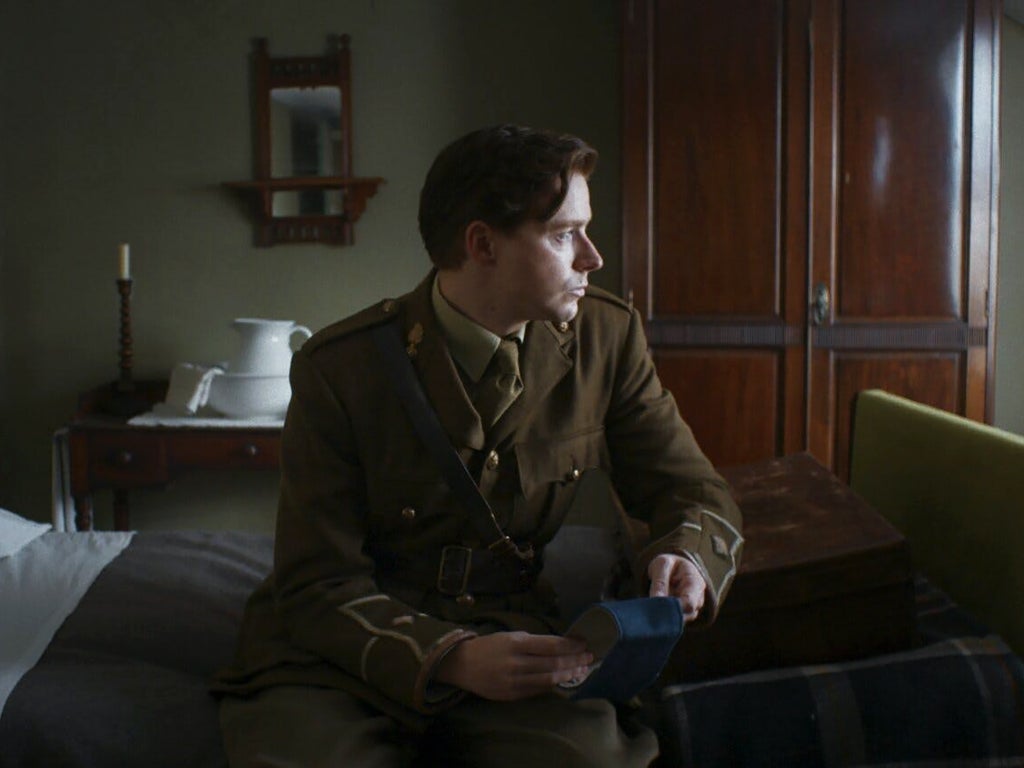
Dir: Terence Davies. Starring: Jack Lowden, Peter Capaldi, Simon Russell Beale, Jeremy Irvine, Calam Lynch, Tom Blyth, Kate Phillips. 12A, 137 minutes.
“Pain is not the only terror,” laments the war poet Siegfried Sassoon in Benediction. But these agonies are nameless to him and, in Terence Davies’s film about his life, we spend a great deal of time fruitlessly trying to put words to his sadness. Benediction isn’t a cradle-to-grave biopic, nor does it dramatise a single, pivotal event. It’s one man’s breathless search, careening back and forth through the chapters of his life in search of something concrete and true. It’s beautiful, but only in the way it tends to its tragedies with such care.
The film begins in 1914. We watch Siegfried (Jack Lowden) and his brother Hamo (Thom Ashley) as they’re fitted for their officer’s uniforms, beaming from ear to ear. Within minutes, Hamo is dead in Gallipoli and Siegfried is hospitalised with trench fever. Traumatised, he refuses to reenlist for a war he now believes has been “deliberately prolonged”, begging for a court-martial and a platform to speak for the dead and deposed. Even if it would end in his own execution. But the social standing of his family prevents such a thing – he’s simply bundled off to an Edinburgh military sanatorium under the pretence of shell shock.
There, he finds intimacy with fellow poet Wilfred Owen (Matthew Tennyson) and subsequently lives with relative openness as a gay man – cocooned within the Bright Young Things of Twenties London. Davies hones in on three of his most notable romances: with actors Ivor Novello (Jeremy Irvine, eyes seductively rimmed with kohl) and Glen Byam Shaw (Tom Blyth), as well as socialite Stephen Tennant (Bridgerton’s Calam Lynch). All three end in heartbreak. “You must redeem my life for me,” he begs the woman, Hester Gatty (Kate Phillips), who’s about to become his wife.
The only steady ground in Benediction lies in Sassoon’s lines of poetry, recited by Lowden and played alongside newsreels of muddied soldiers staring out of the screen – at us, at Siegfried, at Davies too, perhaps. It’s a widely agreed-upon thesis that every one of the director’s films functions, in some way, as autobiography. There are material connections in his early dramas Distant Voices, Still Lives (1988) and The Long Day Closes (1992), set in his native Liverpool. But here, as well as in A Quiet Passion (2016) – his ode to Emily Dickinson – we see Davies refracted through the soul of a fellow poet.
“I have hated being gay, and I’ve been celibate for most of my life,” the director told The Guardian in 2015. And there’s a clear sense of internal torture at work in Benediction, reflected in the calibrated harshness of Nicola Daley’s cinematography. A shot of Siegfried tossing his Military Cross into the River Mersey (an incident debunked when the medal was found in an attic), borders on the garish; several scenes later, the sight of Wilfred and Siegfried floating past each other in a pool, on the verge of touching but not quite doing so, feels divine. That contrast alone is oddly disarming.
Even as Lowden’s face sinks, with the shaky resignation of a man who can feel an entire army marching over his grave, the film sparks up around him with the many barbs and putdowns of that era’s accomplished wits. Irvine and Lynch’s lines are both scathing and silk-spun. A highlight? “Your poetry has gone from the sublime to the meticulous.” Simon Russell Beale appears as Robbie Ross, a devoted friend of Oscar Wilde; Lia Williams is fantastically haughty as the poet Edith Sitwell.
When we meet an older Siegfried (now played, scowlingly, by Peter Capaldi), his search for “something permanent [and] unchanging” has unsatisfactorily led him to the Catholic Church. But nothing will slow those slippery, anonymous terrors – and Benediction, in its final blow, leaves us simply with the downpour of Siegfried’s tears at the sight of a soldier, his legs amputated. The final, heartwrenching lines of Owen’s “Disabled” plays us out: “How cold and late it is! Why don’t they come/And put him into bed? Why don’t they come?”
‘Benediction’ is in cinemas from Friday 20 May







